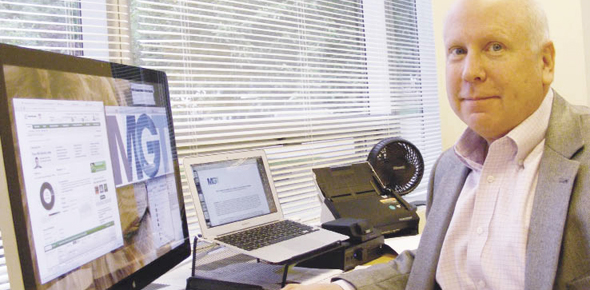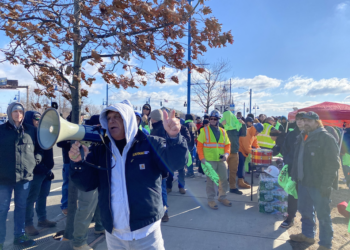
“Luck,” said CEO Robert Ladd, led MGT Capital Investments Inc. to a recent patent acquisition deal that could prove lucky for company shareholders at the expense of the U.S. gambling industry.
His Mamaroneck company”™s $200,000 cash purchase of a majority interest in a bonus-round gaming device for slot machines is the first of several intellectual property deals from which the public company expects to reap rewards, both through legal action against patent infringers and in commercial development.
A former money manager at Neuberger Berman, the international asset management firm, Ladd in 2003 started his own New York City hedge fund, Laddcap Value Partners L.P. An activist small cap fund, Laddcap invested in MGT”™s U.S. and United Kingdom companies and its London-based subsidiary, Medicsight Ltd., a medical technology company.
MGT had focused on Medicsight”™s international portfolio of patents related to development of its medical imaging software used to mathematically analyze CAT scan colonoscopies to detect cancerous polyps. Though the licensed software has been approved by regulatory agencies in Europe and by the U.S. Food and Drug Administration, there has been little demand for it in the highly competitive medical imaging market. Medicsight”™s software sales, primarily in Europe, totaled $319,000 in 2011, a 1 percent decrease from 2010.
Virtual colonoscopies, for which the software is designed as an analytical aid, are not reimbursed by Medicare and gastroenterologists do not much use them, Ladd said. “With Medicare not reimbursing, it became a medical disincentive.” And virtual colonoscopies have not been priced competitively enough to be approved by the Center for Medicare Services as a reimbursable alternative procedure, he said.
“The problem is, the company was running out of cash,” said Ladd, MGT”™s largest shareholder, who has led the company as president and CEO since early 2011. “It”™s a highly research-intensive business. It”™s pretty limited for a company to have that one focus on that one system. We spent about $70 million in developing (the medical imaging software). There really wasn”™t an economic payoff.”
MGT had about $3.5 million in cash when it shifted its central operations last year from London to New York. In September, the five-employee U.S. company leased approximately 2,700 square feet of space for its headquarters at 500 Mamaroneck Ave. in Harrison. Ladd, a Chappaqua resident, said the company moved into fully furnished offices vacated by a hedge fund.
Traded on the recently renamed NYSE Mkt, MGT is working with exchange officials to retain its listing and meet listing standards after consecutive years of operating losses and low trading prices. In an effort at compliance and cost-cutting, shareholders in March approved a reverse stock split in which stockholders with fewer than 500 shares received cash payments. MGT stock closed at $4.56 per share May 14.
MGT has closed its international offices outside of England and nonessential subsidiaries since Ladd took control of the company. The CEO said the company has slashed its cash burn rate from $600,000 to $700,000 a month to $100,000 a month.
This month, MGT made its first strategic investment in intellectual property outside the health care industry after a four- to five-month search for market opportunities. Through a newly formed subsidiary, MGT Gaming Inc., the company is about to close on a deal that gives it a majority interest in a 1-year-old patent on an invention that relates to groups of slot machines linked to an interactive sign. The patent applies to individual bonus rounds displayed on the video sign.
As part of its patent acquisition agreement with the gaming device”™s inventors, MGT will retain on a contingency-fee basis a leading intellectual property law firm in Washington, D.C., with a successful record in the gambling industry to pursue patent infringement lawsuits against Nevada-based slot machine makers. In an enormously lucrative arrangement, casinos lease the machines, Ladd said, and split the daily revenue from them with manufacturers.
How did MGT track down the invention, approved by the U.S. Patent and Trademark Office as U.S. Patent 7,892,088?
“Luck,” said Ladd ”“ Wall Street luck.
One of the gaming device”™s inventors at J & S Gaming Inc. in Dix Hills, Long Island, James Devlin, “is a Wall Street guy” whom Ladd has long known. “He”™s been talking about it forever” and complaining that manufacturers and casino operators were illegally using their invention, Ladd said.
Devlin and co-inventor Steven Brandstetter filed their application in 2001, but were not issued a patent until 2011, about the same time that Ladd took over MGT and began charting a new course for the company.
Brandstetter in an announcement of the deal said he was “ecstatic” that, with MGT”™s legal counsel, he might finally receive compensation from manufacturers and casino operators “that I believe have misappropriated my idea willfully or otherwise.”
For MGT, the gaming deal is the first of several prospective intellectual property acquisitions “with outstanding risk-reward characteristics,” said Ladd. He has his sights on established patents in thermal energy and electronic commerce, the latter “with tens of millions in royalties that have been infringed,” he said.
“For a small company with limited resources, intellectual property seemed to be a very good field both for finding assets to buy but also at reasonable prices with a good cost structure,” Ladd said.




















Comments 1